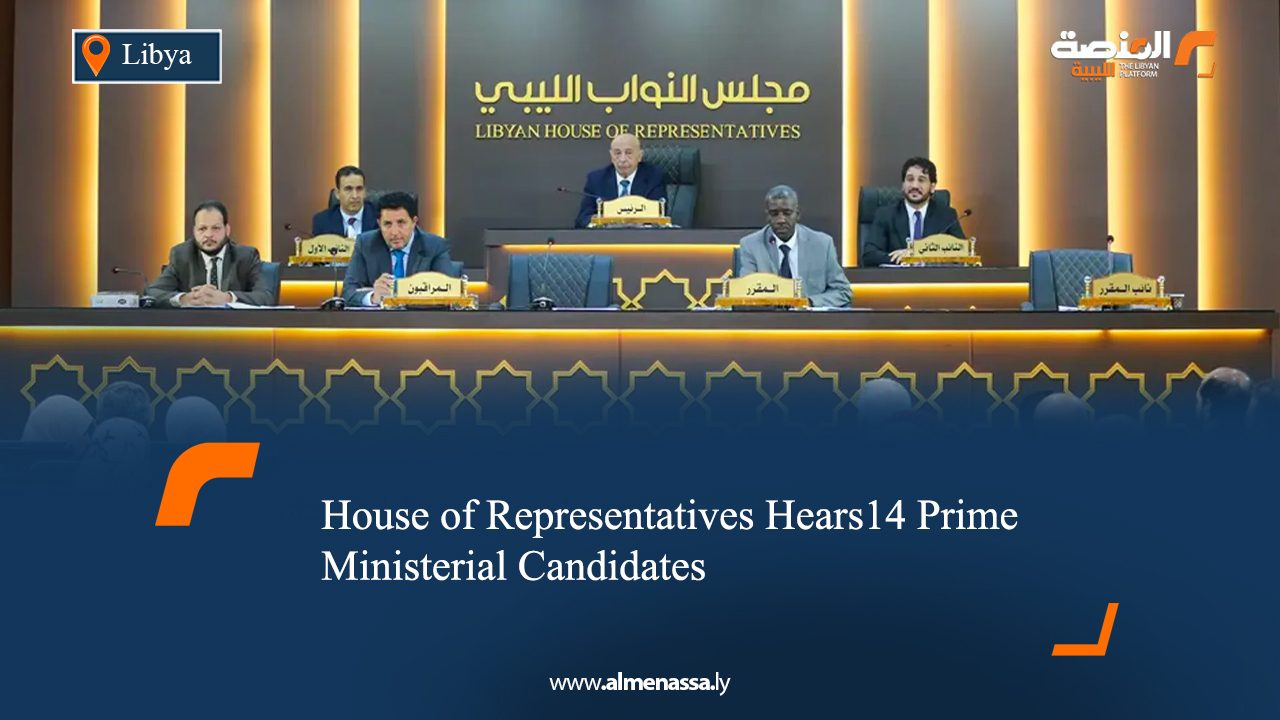The Government of National Unity in Tripoli, led by Abdul Hamid Dbeibah, and the Libyan Government in Benghazi, led by Osama Hamad, both facing escalating popular demands for their departure, the House of Representatives convened a hearing today, Tuesday, for 14 candidates vying for the new prime ministership.
The session featured a detailed presentation of some candidates’ dossiers, followed by a meticulous review of their proposed programmes and action plans. Subsequent steps are slated to determine the criteria for selecting the individual who will assume governmental leadership.
Today’s session was dedicated to hearing the programmes of seven candidates: Abdul Karim Muqaiq, Fadil Al-Amin, Abdul Hakim Baayou, Othman Al-Basir, Muhammad Al-Muzoughi, Muhammad Al-Muntaser, and Ali Sassi.
Abdul Karim Muqaiq: Democracy as the cornerstone of the government programme
Candidate Abdul Karim Muqaiq affirmed that his governmental programme is anchored in five core pillars: democracy, security, justice, reconciliation and coexistence, and social revitalisation. Describing democracy as the “ultimate aspiration,” Muqaiq announced the launch of a comprehensive awareness programme for Libyans, spanning over six months, emphasising that “elections are part of democracy, not its sole objective.” Muqaiq also stressed the imperative of unifying security agencies under the supervision of the Ministry of Interior, asserting his commitment to supporting and securing financial institutions, and enhancing Libya’s presence in the international community.
Fadil Al-Amin: A roadmap to end transitional phases
Fadil Al-Amin presented his vision for a government programme as a clear roadmap to conclude the country’s transitional phases, leading to free and fair elections that garner universal recognition. Al-Amin considered the radical solution to lie in a “one-state policy and a unified government,” advocating for the dismantling of armed formations. He also proposed adopting the Constitutional Declaration as the primary legislative reference until a referendum on the permanent constitution is held. Al-Amin alluded to an ambitious plan to diversify the Libyan economy, encompassing vital sectors such as agriculture, solar energy, logistics, and technology, while simultaneously stressing the importance of political consensus and international recognition to ensure the success of any future electoral process.
Abdul Hakim Baayou: Neutral government and direct budget distribution to governorates
Abdul Hakim Baayou put forth a concept for forming a neutral government, with a mandate limited to one year, extendable by only six months. This government aims to achieve unification and stability without relying on a centralised budget, instead opting for direct budget distribution to the governorates. Baayou pledged to support women and youth, combat corruption, halt fuel and food smuggling, and regulate foreign labour, affirming his commitment to all contracts signed with the state. He declared that his government would be “for all Libyans, not for a city, family, or tribe.”
Othman Al-Basir: Reform first, transition to local administration
Candidate Othman Al-Basir stated that Libya is undergoing a highly critical phase, deeming the formation of a government an absolute necessity. He pledged to work towards achieving a national consensus that would lead to a national project for Libyans. He clarified that his government would be a “government of reform, not construction,” and would primarily focus on laying solid foundations for successful elections. Al-Basir advocated for a shift from central to local administration, stressing that monetary policy would not succeed “in a dead economy,” and that institutions urgently require radical restructuring as an integral part of the country’s national security.
Muhammad Al-Muzoughi: Unconventional government for realistic solutions
Muhammad Al-Muzoughi indicated that his government would operate within a “challenging environment” fraught with obstacles, emphasising the need for an “unconventional” government capable of confronting exceptional circumstances. He pointed out that numerous escalating crises, such as electricity, education, health, and illegal migration, demand realistic solutions and carefully planned strategies. He noted that the failed attempts at state reconstruction are not solely attributable to the failures of officials, but also to the absence of accurate data and studies, asserting that the Libyan state “has never been managed on a scientific basis.”
Muhammad Al-Muntaser: Restoring sovereignty and safe transition towards stability
Muhammad Al-Muntaser denied any legal impediment preventing his candidacy, clarifying that an in absentia judgment issued against him in 2007 concerning the felling of trees on his land had been settled and the fine paid. Al-Muntaser underscored the utmost necessity of “restoring sovereignty and the unity of state institutions,” pledging to launch a comprehensive national process leading to safe and stable elections, the unification of security institutions, and a move away from centralisation through the activation of municipal roles, all within an urgent economic recovery plan.
Ali Sassi: A temporary government with a specific goal
Ali Sassi clarified that his government would be temporary and goal-oriented, bearing the slogan “For a Transition Towards Sustainable Stability.” He pledged to firmly combat financial and political corruption, support youth of both genders, and reinstate previously excluded competencies to their positions. Sassi stressed the imperative of ending political division and organising free and fair elections, with a full commitment to the principle of good governance and institutional unification, all within the framework of comprehensive national reconciliation.
Concluding today’s session, the House of Representatives, Counselor Aqila Saleh, announced the suspension of the hearing for candidates until tomorrow, Wednesday, to allow the House to complete listening to the remaining candidates before proceeding with the voting process to select the new Head of Government.


